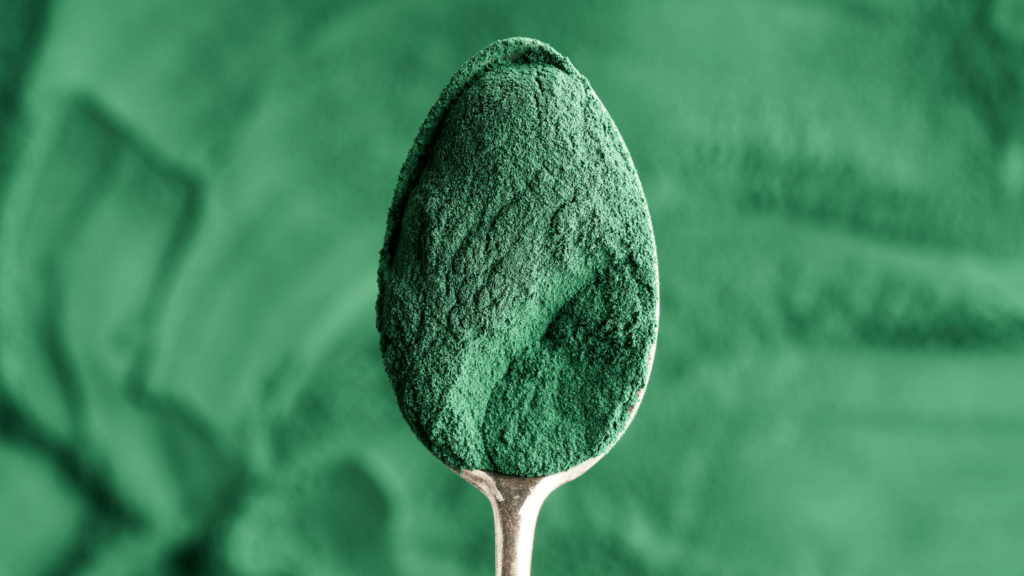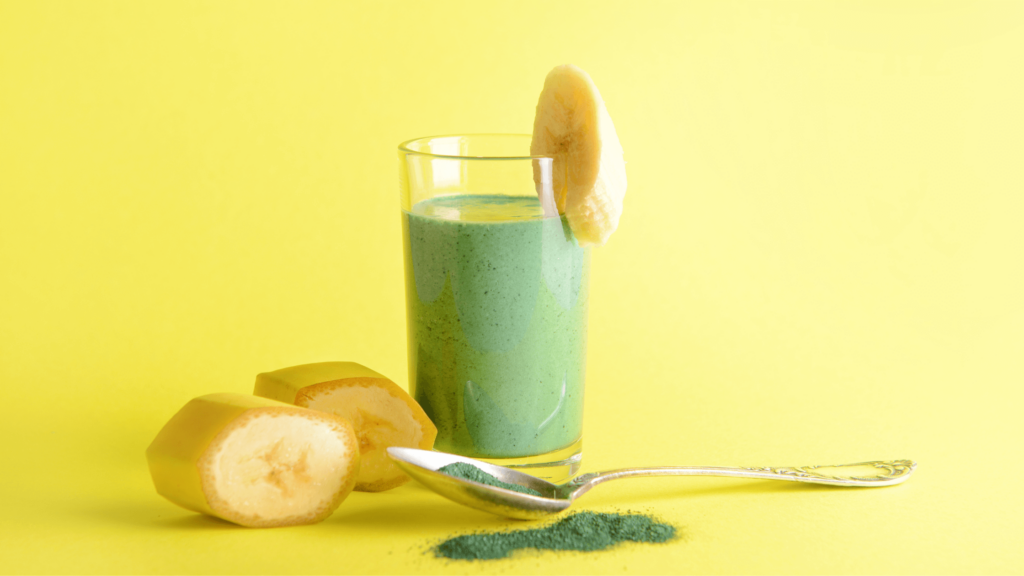Spirulina is one of the most nutrient-dense foods on the planet. This blue-green algae has been used for centuries and is now a go-to superfood for those looking to boost energy, support detoxification, and fight inflammation. Whether blended into a smoothie or taken as a supplement, spirulina offers an easy way to nourish the body and support overall health.
Quick look
- Spirulina is a nutrient-dense superfood packed with protein, antioxidants, and essential vitamins.
- It supports detoxification, boosts energy, and reduces inflammation, making it ideal for active lifestyles.
- Spirulina can enhance endurance, aid muscle recovery, and promote heart health.
- Easily incorporate it into your diet through smoothies or supplements for daily nourishment.
Spirulina: A water-grown superfood

Spirulina is a blue-green algae that grows naturally in fresh and saltwater environments. While it may look like simple pond scum at first glance, this tiny organism is a nutritional powerhouse packed with protein, essential vitamins, minerals, and antioxidants. Its rich nutrient profile has made it a staple in diets worldwide, from the ancient Aztecs who consumed it as an energy booster to NASA, currently exploring spirulina as a nutrient-dense food source for long-duration space missions.
What sets spirulina apart is its impressive protein content—about 60% of its dry weight—and its concentration of iron, B vitamins, and phycocyanin, a powerful antioxidant known for its anti-inflammatory properties. Its dense nutrition and easy digestibility have also earned recognition as a potential solution for malnutrition in developing countries.
Spirulina is typically sold in powder or tablet form, making it easy to incorporate into daily routines. Whether blended into a smoothie, stirred into water, or sprinkled over food, this superfood is a simple and effective way to add nutrients to any diet. Beyond its health benefits, spirulina is also a highly sustainable food source. It requires fewer resources to produce than traditional protein sources like meat or dairy, making it an eco-friendly choice for those looking to reduce their environmental impact.
Top benefits of spirulina
Spirulina isn’t just a trendy superfood—it’s packed with powerful health benefits that support the body from the inside out. From detoxification to energy support, this nutrient-rich algae has been studied for its ability to promote overall wellness. Here’s how spirulina can make a difference in your daily health routine.
Detoxification
In a world where exposure to heavy metals, pollutants, and toxins is unavoidable, spirulina is a natural detoxifier. This blue-green algae has been shown to bind to heavy metals like arsenic, lead, and mercury, helping the body flush them out before they accumulate to dangerous levels.
Research suggests spirulina may also protect the liver and kidneys, two of the body’s primary detox organs. In one study, people with chronic arsenic poisoning saw significant reductions in arsenic levels after supplementing with spirulina and zinc. Additionally, spirulina’s high concentration of antioxidants helps combat oxidative stress, which can contribute to toxin buildup in the body.
Reduces inflammation
Chronic inflammation is at the root of many health issues, from joint pain to heart disease. Spirulina contains a powerful antioxidant called phycocyanin, which gives the algae its distinctive blue-green color and is known for its potent anti-inflammatory properties. By helping to neutralize free radicals, phycocyanin reduces oxidative stress, which can contribute to chronic inflammation and cell damage.
Several studies suggest spirulina may be beneficial for inflammatory conditions such as arthritis, asthma, and autoimmune diseases. Research published in The National Center for Biotechnology Information found that spirulina supplementation helped reduce markers of inflammation in people with osteoarthritis, potentially easing pain and improving mobility.
Boosts energy
When fatigue hits, many people turn to caffeine or sugar for a quick fix—but spirulina offers a more sustainable way to support energy levels. Packed with high-quality protein, iron, and B vitamins, this superfood helps fuel the body by supporting oxygen transport and metabolism, two essential factors in energy production. Since iron deficiency is a common cause of fatigue, spirulina’s iron-rich profile makes it an excellent choice for those looking to combat sluggishness naturally.
Athletes and active individuals often use spirulina to enhance endurance and reduce muscle fatigue. Research suggests that spirulina supplementation may improve oxygen use during exercise, helping the body perform more efficiently and recover faster. Recent studies have found that spirulina increased time to exhaustion in trained athletes, meaning they could work out longer before feeling fatigued. Unlike stimulants that cause energy crashes, spirulina provides a steady energy source by supporting cellular function and muscle recovery.
Supports immune function
A strong immune system is key to staying healthy, and spirulina provides a natural boost with its rich supply of vitamins, minerals, and antioxidants. These include immune-supporting nutrients like vitamin C, vitamin E, zinc, and iron, all of which help protect the body from infections and illness. Additionally, phycocyanin helps regulate immune function and fight oxidative stress, reducing the burden on the body’s defense system.
Promotes heart health
Heart disease remains one of the leading causes of death worldwide, but diet and lifestyle choices play a significant role in cardiovascular health. Spirulina has been studied for its ability to support heart health by reducing LDL (bad) cholesterol, improving blood pressure, and combating oxidative stress—all key factors in preventing heart disease. Research suggests spirulina may help lower LDL cholesterol and even increase HDL (good) cholesterol.
Spirulina may also help reduce blood pressure by increasing nitric oxide production, which allows blood vessels to relax and improves circulation. By reducing inflammation and oxidative damage, spirulina helps keep blood vessels healthy and supports cardiovascular function.
When’s the best time to take spirulina?
Energy, endurance, and recovery are essential for long shifts for construction workers, tradespeople, and anyone in the AEC industry. Spirulina is a natural way to fuel your body, improve stamina, and support recovery, but when you take can make a big difference.
Morning: Start the day with more energy
If you’re up before the sun, spirulina can help kickstart your energy levels without the crash of caffeine. Packed with protein, iron, and B vitamins, it helps fight fatigue and keeps you going through those early morning job site meetings. Adding a scoop of spirulina powder to a smoothie or yogurt or mixing it with water can give your body a nutrient-packed boost to stay sharp and focused.
Before work or training: Support endurance and stamina
Physically demanding jobs require strength and endurance. Taking spirulina before work or a workout can help improve oxygen use and reduce muscle fatigue, making it easier to lift, carry, and stay on your feet all day.
Evening: Aid recovery and detoxification
Your muscles and joints need to recover after a long day of lifting, climbing, and working with tools. Spirulina’s high antioxidant content can help reduce inflammation and support overnight muscle repair. It also binds to toxins and heavy metals, allowing the body to flush out harmful substances—a great option if you work in environments with dust, fumes, or other job site pollutants. Taking spirulina in the evening, either in a capsule or mixed into a calming herbal tea, can help the body reset for the next workday.
Recommended spirulina dosage
When it comes to spirulina, a little goes a long way. Most people take 1–3 grams per day (about ½ to 1 teaspoon of powder), but higher doses—up to 10 grams daily—are sometimes used, especially by athletes or those seeking specific health benefits.
Spirulina has a strong, earthy taste, which some people love and others… not so much. If you’re new to it, starting with a small dose and gradually increasing can help your body adjust while avoiding digestive discomfort.
While spirulina is generally safe, consulting a healthcare provider is a good idea—especially if you have underlying health conditions, take medications, or are pregnant. Since spirulina can interact with blood thinners or autoimmune conditions, it’s always best to check first.
Try this spirulina smoothie

One of the easiest ways to consume spirulina is by blending it into a smoothie. Pairing it with naturally sweet fruits like bananas, mangoes, or pineapples helps balance its flavor while giving you a refreshing energy boost.
Try this super green spirulina smoothie—it’s quick, easy, and nutritious (serves 1):
Ingredients:
- 1 medium ripe banana (previously peeled and frozen; ~1 cup as original recipe is written)
- 1/2 cup sliced cucumber (skin on)
- 3/4 – 1 cup light coconut milk (or other non-dairy milk; less for a thicker smoothie, more for a thinner smoothie)
- 1 cup spinach or chopped kale
- 1 tsp spirulina powder
- 1 tbsp hemp seed (optional; you can also sub chia seeds or vegan protein powder)
For serving (optional)
- 1/4 cup frozen or fresh blueberries (organic when possible)
- 1/4 cup granola (store-bought or homemade*)
Instructions
- To a blender, add frozen banana, cucumber, coconut milk, spinach, spirulina, and hemp seed (optional). Blend until creamy and smooth, scraping down sides as needed.
- If it is too thick, thin it with water or more coconut milk. If it is too thin, thicken it with ice or add more frozen bananas. Taste and adjust the flavor as needed, adding more banana for sweetness, cucumber for freshness, or greens or spirulina for green color.
Serve immediately or take to work in an insulated travel cup. It is best when fresh, though leftovers can be kept in the refrigerator for up to 2 days or in the freezer for 1 week. Thaw to enjoy from the freezer.
Bottom line
Spirulina is more than just a trendy superfood—it’s a nutrient powerhouse that supports energy, detoxification, and overall health. Its high protein content, rich supply of antioxidants, and essential vitamins and minerals make it a simple yet effective way to boost your body.
If you want more practical nutrition tips, wellness insights, and easy-to-follow recipes, subscribe to our newsletter! Get expert-backed content delivered straight to your inbox to stay healthy, energized, and ready for whatever the day throws at you.



1 comment